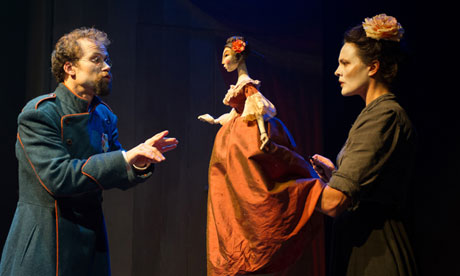
Laurence Boswell's response to the challenge of transforming The Double for the stage is astutely theatrical. In Dostoevsky's second novel, a clerk is driven insane by the arrival in his life of a man who is his exact double. Or is the story actually about a clerk whose increasing madness leads him to imagine the arrival in his life of a man who…? Prose lends itself more readily to this kind of ambiguity than does performance. So how does Boswell (adaptor and director) do it? By sharing the roles between actors, puppets (operated by the actors in full view of the audience) and disembodied voices (issuing via speakers from the auditorium); The Double becomes simultaneously a stunningly manipulated rod puppet and a convincingly manipulative character (in the magic-working hands of Nicholas Karimi, Jane Leaney and Sean Murray).
Simon Scardifield is magnificent as the disintegrating flesh-and-blood Golyadkin. The image of him drunkenly dancing with the lifesize Double – puppet and man both supported by the actor/operators, while Rob Edwards's Storyteller watches in dismay – is as moving and as densely communicative as poetry.
Like so much else in this production, including Ti Green's puppet-booth set in an infinity of sky and by Ben Ormerod's canal-conjuring lighting, it is effected with a seeming simplicity that is actually fiendishly difficult to achieve.
Yet, even while admiring, I feel something is missing. Dostoevsky subtitled his 1846 novel A Poem of St Petersburg, suggesting a potentially satiric doubling of the personal and the political. Here, this is overshadowed by the vivid psychological portrayal of the hero: a fault doubling as a virtue.

